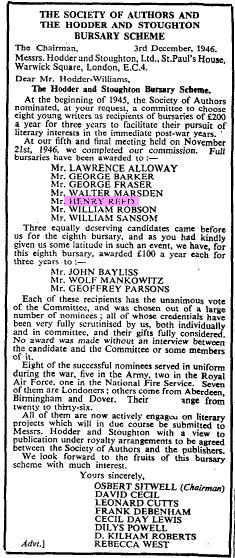On Sunday evening, March 16, 1952, at 6:00 PM, Reed's radio play, The Streets of Pompeii, premièred on the BBC's Third Programme, featuring the music of Anthony Smith-Masters, and the voice talents of Flora Robson, Marius Goring, and Carleton Hobbes (as the Lizard). Richard Trewin, in his review for the Listener the following Thursday (after a repeat broadcast), had this to say:
Henry Reed, summoning atmosphere eagerly, was excited about Pompeii, but he took a long time to fire us. During the first hour of a mixture of this-way-to-the-tomb intensity and cheerful chatter, I felt as if I were walking on a battered and dangerous mosiac pavement. All well for a moment or so; then a trip over a loose tile, and a headlong sprawl. Still, at length, the author (and the producer, Douglas Cleverdon) startled genuinely in a reconstruction of the last hours of Pompeii under that engulfing flood of hot, wet ash. This was a real and terrifying return journey. (Listener 47, no. 1203 (20 March 1952): 487.)
Despite this tepid-to-fiery reception, in 1953 The Streets of Pompeii was awarded the Premio della Radio Italiana (the Italia Prize for literary or dramatic programs), by the RAI (Italian radio and television). The awards ceremony was held in Palermo that year, but I have no evidence Reed was in attendance.
More than a quarter of century later, in 1979, the Society of Authors selected Reed for its Pye Radio Gold Award, not for a radio broadcast in the preceding year, but for his "outstanding achievement in radio." (Wade, David. Times London, "Out of the Smoke, Into the Sound," 17 November 1979, 13.) The award was in recognition not only for Reed's 1946 radio adaptation of Moby Dick and many dramas set in Italy, but also for his seven-part comic/literary/musical sequence of Hilda Tablet plays.
There is a third award which Reed neglects to list. In 1945, a committee was appointed by the Society of Authors to award to eight deserving young authors the Hodder and Stoughton Bursary Scheme—a stipend of £200 a year for three years—in order to "facilitate their pursuit of literary interests in the immediate post-war years." Sitting on the committee were C. Day Lewis and Rebecca West, and it was chaired by Sir Osbert Sitwell. The first two recipients were announced in November, 1945 as Henry Reed and William Robson. The remaining authors were advertised the following year as Lawrence Alloway, George Barker, John Bayliss, George Fraser, Wolf Mankowitz, Walter Marsden, Geoffrey Parsons, and William Sansom (there was a three-way tie for the eighth bursary):

Times (London), 20 December 1946, 6.
In a 1946 questionnaire in the journal Horizon, a panel of eminent British authors including Elizabeth Bowen, Robert Graves, and George Orwell were asked, "How much do you think a writer needs to live on?" The consensus seems to be about £1000 a year, which was Reed's answer (although Bowen was more comfortable with £3,500). It's possible Reed didn't feel the generous bursary was worth mentioning by the time he penned his entry for Who's Who, but it would have certainly been welcome in 1945, and undoubtably went great lengths toward encouraging Reed's career as a poet, critic, and playwright.







